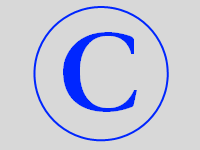 Bloggers and online publishers have to follow copyright laws just as any traditional publisher must. However, there is a gray area of copyright law, called fair use, that many online publishers refer to when their content is called into question.
Bloggers and online publishers have to follow copyright laws just as any traditional publisher must. However, there is a gray area of copyright law, called fair use, that many online publishers refer to when their content is called into question.
So what are the copyright laws and fair use legalese that you need to know as a blogger so you stay out of legal trouble?
First, understand that claiming ignorance is not a viable excuse in a court of law. The onus is on you as a publisher to know the laws that apply to you.
Second, understand that every piece of written content, audio content, video content, image content, and so on is owned by someone. Whether the person who created it owns it or the piece is owned by someone who purchased it or derived ownership in some other way — the bottom-line is the same. Someone owns it! Therefore, the owner holds the rights to that piece of content and that piece of content is automatically protected under copyright law in the United States (laws might differ in other countries, so if you live in another country, be sure to do your research and learn the laws that apply to you). That means, the owner holds the copyright to that piece of content.
Third, understand that you cannot re-publish another person’s work without their permission or acceptable compensation per copyright laws. Permission can be written and compensation could be monetary or another form of payment that the owner agrees to.
Wait a minute! You might be wondering – “does that mean that I have to get permission to use every image I publish on my blog that I didn’t create?”
Technically, yes.
But don’t freak out yet! This is where fair use comes into play.
Fair use is that gray area of copyright law that says you can republish another person’s work for the purpose of adding commentary, criticism, education, research, or news reporting. However, that’s a pretty vague description that just about any online publisher could hide behind. And that’s exactly why fair use is so gray. If someone accuses you of copyright infringement, you could defend yourself claiming you republished the work under the guidelines of fair use. However, that’s not a solid defense, and you might not win. Again, it’s a gray area of the law that is not cut and dry.
So what’s a blogger to do? You need images to add some visual appeal to your blog, and you want to be able to refer to other content that you read online and want to discuss on your blog within your posts. However, these copyright laws are really limiting your creative flow.
Don’t worry. There are several ways to get around strict copyright laws, which I’m going to discuss in more detail in my next couple of posts on Performancing.
In a nutshell, here’s the gist of what you should avoid if you don’t want to get in trouble with the law:
- Don’t plagiarize. It’s okay to quote a snippet of another person’s content, but don’t republish the entire piece and pretend you wrote it. That’s breaking another law entirely!
- Always attribute your sources with a link to them within your blog posts.
- Don’t use an image on your blog unless you have permission to do so or it has a copyright license attached to it that allows you to use it. (I’ll be writing more about this next week).
- Find images, audio, and video content to publish on your blog that you’re actually allowed to use. (I’ll give you some good sources in a post next week).
So there you go — copyright laws for bloggers and online publishers condensed into approximately 500 words and devoid of legal jargon. Stay tuned for lots of additional copyright help here on Performancing!
